Dental implant surgery in Iran has gained significant popularity due to its high-quality and cost-effective services. Renowned for its advanced medical facilities and skilled dental professionals, Iran offers various dental implant options to cater to various needs. The surgery involves the placement of artificial tooth roots into the jawbone, providing a strong foundation for replacement teeth.
Iranian dentists ensure precise and successful implantation procedures with state-of-the-art technology and modern techniques. Moreover, the affordability of dental implants in Iran makes it an appealing choice for domestic and international patients seeking reliable and affordable dental care due to Iran's efficient dental implant cost.
What Is Dental Implant Surgery?
Some people lose one or more of their teeth due to aging, gum diseases, drug addiction, poor oral hygiene, accidents, gastric cancer, etc. Losing teeth affects one's appearance and causes other problems, such as digestive diseases caused by eating poorly.
In the past, people who had lost their teeth had to use dentures, but the problem with the dentures was that over time, jawbone atrophy caused them to become loose and move while eating and talking. However, with the help of dental implant surgery, the teeth are fixed into the jaw, and there is no need to take them out regularly. Also, tooth implants prevent jawbone atrophy and improve oral health.
Why Iran for Dental Implant Surgery?
Iran is among the best countries in the Middle East for dental implant surgery because it has the most well-educated, experienced, detail-oriented, and artistic dentists. Also, in dental clinics in Iran, you can benefit from the latest facilities and technologies and the help and guidance of skilled assistants and technicians.
Moreover, most dental clinics in Iran have high-standard panoramic X-ray machines that take pictures of the entire mouth (both the upper and lower jaws) in one shot. These devices have low radiation levels, making them safe for children, pregnant women, and breastfeeding moms. Last but not least, the price of a dental implant in Iran is much more affordable than in other countries, especially in the U.S. and Europe.
Dental Implant Cost in Iran
Dental implant cost in Iran generally depends on dental implant clinics and dentists in Iran, which include:
- The knowledge and experience of the dentist
- The complexity of the surgery
- The services provided by the dental clinic
- The type and brand of implant prosthesis (the metal part and the actual tooth)
- The number of implants needed
- The potential need for bone grafting or sinus augmentation.
On average, the cost of dental implants in Iran varies between $100 to $1,000 per tooth, while in the U.S., the price of a dental implant starts from $ 1,500 for a single tooth.
Types of Dental Implants in Iran
In Iran, three types of dental implants are used. In the following, these tooth implants are introduced briefly:
- Endosteal
In this implant, the metal root is completely fixed into the jawbone and holds the new artificial tooth. Endosteal is suitable for people with extra space between their teeth (diastema) and aged people who should use dentures.
- Subperiosteal
These implants are placed on the jawbone and beneath the gums. This type of implant is suitable for people with severe jawbone atrophy. Although planting subperiosteal implants takes only one or two appointments and has a shorter recovery period, they will last shorter because they are placed above the jawbone and not inside it.
- Zygomatic
In this type of implant, metal tooth implants are placed inside the cheekbone, not the jaw. These dental implants are usually used for patients who suffer from serious bone atrophy in their upper jaw, severe tooth decay, and severe periodontal diseases.
Best Candidates for Dental Implant Surgery
Dental implants usually require healthy and dense jawbones to support them, so the patient's bone mass is essential for successful dental implant surgery.
Although everyone can undergo this surgery, this surgery is more proper for patients who:
- Have lost all their teeth;
- Have lost teeth on one side of their jaw;
- Have a gap between their teeth;
- Have enough bone density;
- Have good oral health and
- Cannot or do not want to use dentures.
Who Is Not a Good Candidate for Dental Implants?
Usually, dental implant surgery is not recommended to people who:
- Have jaw and gum infection;
- Smoke cigarettes and other drugs;
- Have serious health problems such as diabetes, osteoporosis, autoimmune disorders, and hemophilia;
- Have poor oral hygiene;
- Have blood clotting problems or are taking blood thinner medications such as aspirin;
- Pregnant women;
- Are using cancer drugs or are undergoing chemotherapy and radiotherapy;
- Doesn't have sufficient bone mass.
Best Dentists for Dental Implant Surgery in Iran
In Iran, there are numerous dentists specifically trained for dental implant surgery. Most dental surgeons in Iran have graduated from top universities in Iran and other countries and are well-known in international dentistry associations.
Moreover, dental specialists in Iran are experienced, knowledgeable, trustworthy, artistic, friendly, and sympathetic. Most importantly, they are meticulous and cautious in choosing their assistants. Therefore, their technicians and assistants are primarily experienced and well-disciplined.
How to Prepare for Tooth Implant Surgery?
Before tooth implant surgery, follow these instructions:
- Get a dental examination and if necessary, take x-ray images (called CBCT or DVT) from your entire mouth;
- In case of having an infection, take prescribed antibiotics;
- Inform your surgeon of your drug allergies;
- Prepare soft foods such as soup and mashed potato;
- Brush your teeth and wash your mouth with mouthwash on the day of the surgery;
- If you are stressed out, you can use anti-anxiety medications to relieve your anxiety;
- Do not eat or drink for at least eight hours before the operation, and
- Wear comfortable clothes and shoes on the day of the surgery.
The procedure of Dental Implant Surgery in Iran
Dental implant surgery begins with local anesthesia, like any other oral surgery, so you will not feel any pain during the operation. In some cases, dental implant surgery under general anesthesia may be necessary. The operation must be performed in special dental clinics and with specific equipment.
After administering anesthesia, according to the surgery method, the tooth implant is placed inside the jaw bone, above it, or inside the cheekbone. Usually, it takes 12 to 24 weeks for the implant to get fixed inside the jawbone. During this time, your doctor may put a temporary crown on the abutment to make it easier for you to chew and talk. At last, when the metal implant is fixed and the jawbone has healed completely, a crown made of acrylic plastic or ceramic is placed on the root.
Contact us for a free initial consultation about Dental Implants in Iran
WhatsAppTelegramFacebookEmailDental Implant Surgery Aftercare
After dental implant surgery, it is necessary to consider the following care:
- Since it may take a couple of hours for the anesthesia to wear off completely, ask someone to drive you home and take care of you for some hours;
- If you have pain, take the prescribed painkillers;
- Eat soft dishes and avoid chewing hard stuff like ice and chips;
- Do not have hot and cold drinks for a couple of days after the surgery;
- Brush and floss your teeth from a day after the surgery;
- Avoid drinking coffee, tea, and alcoholic beverages for the first three days after the operation;
- Rinse your mouth with chlorhexidine mouthwash from a day after the surgery and
- Avoid smoking for at least a week.
Possible Complications of Dental Implant Surgery in Iran
- Pain
- swelling
- bleeding
- anesthesia
- vomiting and nausea
- drowsiness
- infection due to a fracture
- rejection of implants by the patient's body
- damage to adjacent muscles or sinus cavity
- damage to healthy teeth, etc.
The items explained are some possible complications of dental implant surgery; however, they are mostly temporary and can be eliminated by the surgeon.
Advantages of Dental Implant
The main advantage of dental implant surgery is that you regain your chewing power. Besides, it has some other benefits, such as:
- It enhances your beauty;
- Its results last for a lifetime;
- It improves your speaking by substituting loose teeth with fixed and healthy ones;
- It improves your confidence;
- It prevents jawbone atrophy;
- It prevents change in the form of the jawbone and
- It is stable and strong (unlike dentures).
Dental Implant Surgery for Diabetics
Since diabetes causes oral infection and delays wound healing, dental implant surgery for people with diabetes is risky and has a lower chance of success. Some of the possible risks of this surgery for people with diabetes include gum infection, severe bleeding, and oral cavity due to mouth dryness.
Although performing dental implant surgery for people with diabetes is risky, it does not mean they can never use this treatment. By following a few tips, diabetics can also benefit from this surgery. These tips include:
- Controlling blood sugar regularly;
- Following a specific health plan;
- Treating gum diseases and
- Reducing sugar intake.
FAQs about Dental Implants in Iran
1) Is dental implant surgery in Iran Painful?
Since this surgery is performed under general or local anesthesia, you won't feel pain during the operation. However, you may feel a mild sore in your jawbone after the surgery, which can be controlled using painkillers.
2) How long after dental implant surgery should I stay in Iran?
You can get back home almost three to four days after the surgery.
3) How long do dental implants last?
Generally, dental implants will last for a lifetime if you maintain good oral hygiene. However, dental implant crowns should be changed every ten years.
4) Is doing dental implant surgery in Iran safe?
Yes. In Iran, dental implant surgery is done by the hands of specialized dentists and with standard equipment, so doing this surgery in Iran is safe.
5) Should I take medicine in Iran before and after dental implant surgery?
After getting examined by your dentist, they will determine if you need to take antibiotics before the surgery. Also, you may need some sedatives to relieve your pain after the surgery.

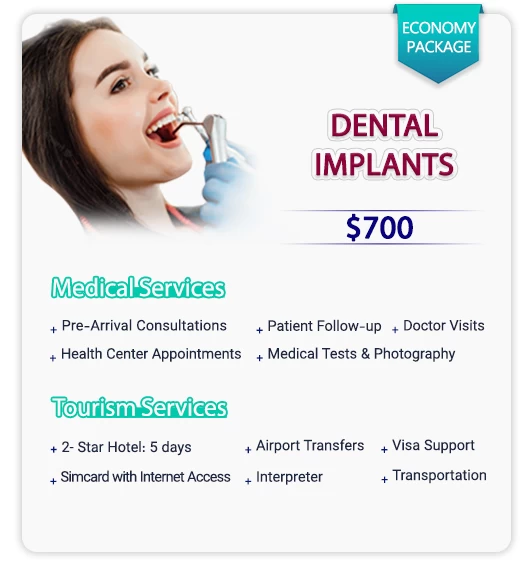
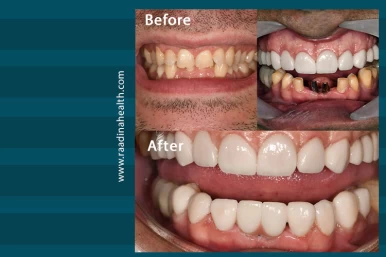
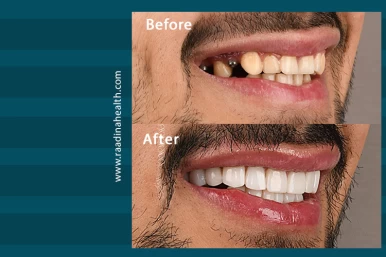
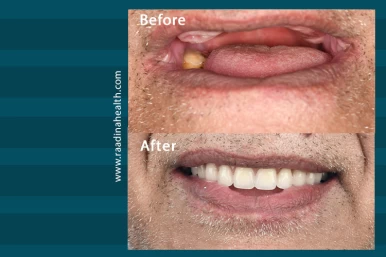
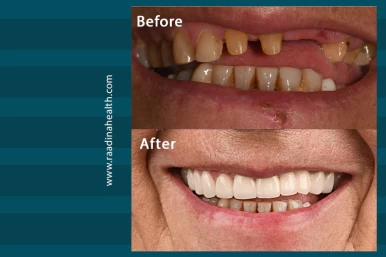
comments
6 comment
User
I've been considering dental implants, but I'm worried about the pain during and after the procedure. How painful is it?
Habib Ebrahimi
Hello dear friend,
While some discomfort is expected during the initial recovery, the procedure itself is generally performed under local anesthesia, which minimizes pain. After the implant is placed, you may experience some swelling and mild discomfort, but these symptoms can be managed with pain relief medication. Our experienced dental professionals in Iran ensure that you're as comfortable as possible throughout the process.
User
Where can I get a list of well qualified dental specialist surgeons for bone graff , implant , and crown , also would help what city . Thanks
کارشناس رادینا سلامت
Dear User,
Please contact us on WhatsApp for more information regarding dental treatment. +989026921957
User
I know the government of Iran is at odds with the United States government. Is it a problem for a female American to navigate this process alone? Thank you, Colleen
کارشناس رادینا سلامت
Dear user,
Regardless the current situation, what matters is the purpose of your travel. Since you want to come to Iran for medical purposes, you won't have to worry about the situation. In order to apply for the medical visa, please contact us on WhatsApp. +989026921957